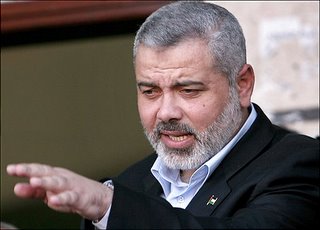Taken from Washington Post, November 10, 2006
By IBRAHIM BARZAK, The Associated Press
GAZA CITY, Gaza Strip -- Palestinian Prime Minister Ismail Haniyeh said Friday he would be willing to sacrifice his job if the international community would lift economic sanctions that have crippled his Hamas-led government.
Haniyeh's statement was the latest indication that the Islamic Hamas group was nearing a deal to form a national unity government with Palestinian President Mahmoud Abbas' moderate Fatah Party that would be made up of independent experts.
Such a coalition would presumably present a more moderate face to the world and convince the West to restore hundreds of millions of dollars in international funding.
"When the issue of the siege is on one side, and my being prime minister is on the other, let the siege be lifted to end the suffering of the Palestinian people," Haniyeh said, referring to the sanctions that have caused widespread hardship in the West Bank and Gaza Strip.
Haniyeh's comments came a day after Abbas spoke on the phone with his main political rival, Hamas' supreme leader Khaled Mashaal _ their first conversation since April. Hamas spokesman Fawzi Barhoum said their discussion indicated the sides were nearing agreement.
The international sanctions, including tax revenues Israel has withheld since Hamas took power in March, has made it largely impossible for Hamas to pay the government's 165,000 employees.
The West, including the United States, has said it will not lift sanctions unless Hamas recognizes Israel, renounces violence and accepts past peace deals, something Hamas has so far refused to do.
The program of the proposed new unity government is vague on the key issue of recognizing Israel, calling for a Palestinian state on only the lands captured by Israel in the 1967 Mideast War. Hamas' charter calls for an Islamic state on those lands as well as Israel.
In addition to the economic sanctions, Palestinians in Gaza have weathered a monthslong Israeli offensive that began after Hamas militants tunneled into Israel and captured a soldier in June.
More than 50 people have been killed in recent days in the Israeli artillery barrage, which aimed at preventing Palestinian militants from firing rockets at Israel. Among them were 19 killed Wednesday in the northern Gaza Strip town of Beit Hanoun when shells landed as residents were sleeping.
The U.N. Security Council will vote Saturday on an Arab-backed draft resolution condemning the Israeli military offensive in Gaza and demanding a withdrawal of Israeli troops from the coastal strip, a European diplomat said.
The draft requests the U.N. secretary-general establish a "fact-finding mission" to probe Wednesday's attack in Beit Hanoun, and asks the international community to restart the peace process with the "possible establishment of an international mechanism for protection of the civilian populations."
The U.S. blocked a U.N. Security Council resolution this summer demanding Israel halt its offensive in the Gaza Strip. It was the first Security Council veto in nearly two years.
Meanwhile, thousands marched through Middle East capitals Friday to protest an Israeli offensive, their calls often spilling into a broader outcry against America's policy in the region and its backing of Israel.
In Jordan, some 1,000 demonstrators filed into the streets after Muslim noon prayers, chanting slogans in support of the Palestinians, but also against the sentencing of Saddam Hussein in neighboring Iraq.
In Sudan, about 2,000 people gathered in front of the United Nations mission building and burnt American and Israeli flags. "Down down USA, we won't be governed by the CIA," chanted the crowd, which was prevented by police from approaching the U.N. building.
Similar protests were held in Egypt, Syria and Lebanon.
In an interview with NBC's "Today" show Friday, Israeli Prime Minister Ehud Olmert defended himself against critics who said Israel was using too much force against the Palestinians, saying he thinks "we are very, very restrained in using power."
"When someone criticizes us, I say what would you do when rockets fall on the heads of innocent Israelis?" he said.
Israeli Defense Minister Amir Peretz ordered the military to "re-evaluate its policy of artillery fire in Gaza," his ministry said in a statement.
Saturday, November 11, 2006
Palestinian PM Offers To Resign For Aid
Subscribe to:
Post Comments (Atom)





No comments:
Post a Comment